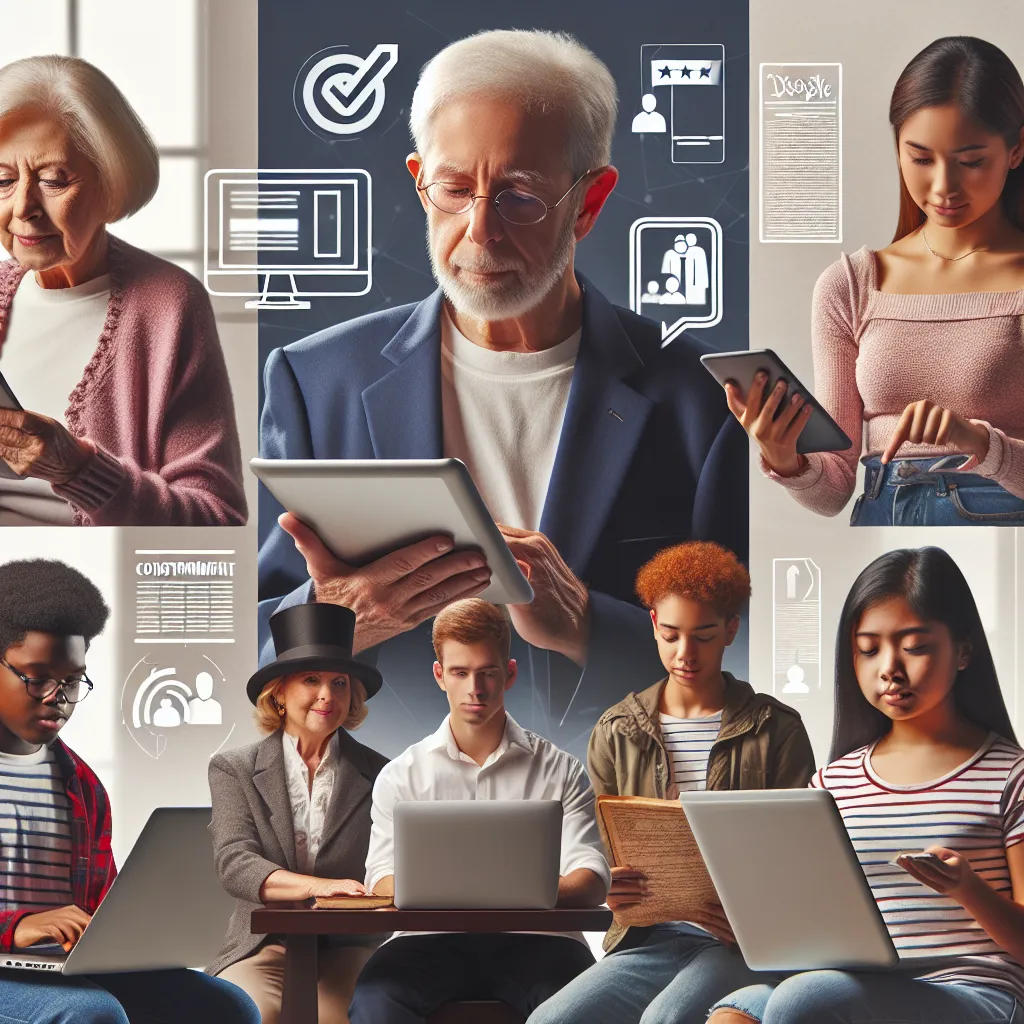Digital literacy has become an increasingly important topic in recent years, particularly in relation to its impact on democratic processes. This subject has appeared in various forms in IELTS Writing Task 2 questions, and its relevance is likely to grow in the future. Let’s explore a sample question and provide a high-scoring essay response to help you prepare for this potential topic.

Analyzing the Question
Let’s consider the following IELTS Writing Task 2 question:
Some people believe that digital literacy is essential for maintaining a healthy democracy in the modern world. To what extent do you agree or disagree with this statement?
This question asks you to discuss the relationship between digital literacy and democracy. It’s an opinion-based question that requires you to take a stance and support it with logical arguments and relevant examples.
Sample Essay (Band 8-9)
Digital literacy, the ability to use and understand digital technologies, has become increasingly crucial in our interconnected world. I strongly agree with the statement that digital literacy is essential for maintaining a healthy democracy in the modern era. This essay will explore how digital literacy empowers citizens to participate more effectively in democratic processes and helps safeguard democracy against misinformation.
Firstly, digital literacy enables citizens to access and critically evaluate information, which is fundamental to making informed decisions in a democracy. In the digital age, vast amounts of information are available online, including government policies, political debates, and current events. Digitally literate individuals can navigate this landscape, discerning credible sources from unreliable ones. For instance, during elections, voters with strong digital skills can research candidates’ positions, fact-check claims, and engage with a diverse range of perspectives, leading to more informed voting decisions.
Moreover, digital literacy fosters greater civic engagement and participation in democratic processes. Social media platforms and online forums provide spaces for public discourse and activism. Digitally literate citizens can effectively use these tools to voice their opinions, organize grassroots movements, and hold elected officials accountable. For example, the Arab Spring demonstrations in the early 2010s were largely coordinated through social media, showcasing how digital literacy can empower citizens to mobilize for democratic change.
However, it is crucial to acknowledge that digital literacy also plays a vital role in combating threats to democracy in the digital realm. The spread of misinformation and disinformation online poses significant challenges to democratic societies. Individuals with strong digital literacy skills are better equipped to identify and resist false or misleading information. They can verify sources, understand the context of digital content, and recognize manipulation tactics such as deepfakes or bot-driven campaigns. This critical thinking ability helps maintain the integrity of public discourse and protects democratic institutions from erosion due to digital manipulation.
Furthermore, digital literacy supports transparency and accountability in government. Digitally literate citizens can access and interpret open government data, track legislative processes, and engage with e-government services. This increased transparency can help reduce corruption and enhance trust in democratic institutions. For instance, many countries now publish budget information online, allowing citizens to scrutinize public spending and hold officials accountable for their financial decisions.
In conclusion, digital literacy is undeniably essential for maintaining a healthy democracy in our increasingly digital world. It empowers citizens to make informed decisions, facilitates civic engagement, combats misinformation, and promotes government transparency. As technology continues to shape our societies, fostering digital literacy should be a priority for educational systems and policymakers to ensure the continued strength and resilience of democratic systems worldwide.
(Word count: 407)
Key Points to Remember
-
Structure: The essay follows a clear structure with an introduction, body paragraphs, and a conclusion. Each paragraph focuses on a specific aspect of how digital literacy supports democracy.
-
Thesis Statement: The writer’s position is clearly stated in the introduction: “I strongly agree with the statement that digital literacy is essential for maintaining a healthy democracy in the modern era.”
-
Topic Sentences: Each body paragraph begins with a clear topic sentence that introduces the main idea of the paragraph.
-
Examples: The essay includes specific examples to support the arguments, such as the Arab Spring demonstrations and the publication of government budget information online.
-
Cohesion: The essay uses cohesive devices to link ideas and paragraphs, such as “Firstly,” “Moreover,” and “Furthermore.”
-
Vocabulary: The essay demonstrates a wide range of vocabulary related to the topic, including “civic engagement,” “misinformation,” and “transparency.”
-
Grammar: The essay uses a variety of complex sentence structures and demonstrates accurate use of grammar throughout.
Important Vocabulary
Here are some key vocabulary words used in the essay:
- Digital literacy (noun) – /ˈdɪdʒɪtl ˈlɪtərəsi/ – The ability to use and understand digital technologies
- Misinformation (noun) – /ˌmɪsɪnfərˈmeɪʃn/ – False or inaccurate information
- Civic engagement (noun) – /ˈsɪvɪk ɪnˈɡeɪdʒmənt/ – The ways in which citizens participate in the life of a community
- Grassroots movement (noun) – /ˈɡrɑːsruːts ˈmuːvmənt/ – A movement that starts at a local level
- Accountability (noun) – /əˌkaʊntəˈbɪləti/ – The fact or condition of being accountable
- Transparency (noun) – /trænsˈpærənsi/ – Openness and clarity in activities or governance
- Scrutinize (verb) – /ˈskruːtənaɪz/ – To examine or inspect closely and thoroughly
- Resilience (noun) – /rɪˈzɪliəns/ – The ability to recover quickly from difficulties
Conclusion
Understanding the relationship between digital literacy and democracy is crucial for success in IELTS Writing Task 2. This sample essay demonstrates how to approach this topic comprehensively, providing a clear stance, well-structured arguments, and relevant examples. As you prepare for your IELTS exam, practice writing essays on similar topics, such as the impact of social media on politics or the role of technology in civic participation. Remember to focus on clear structure, varied vocabulary, and strong supporting examples in your writing.
We encourage you to practice writing your own essay on this topic and share it in the comments section below. This active practice will help you improve your writing skills and prepare effectively for the IELTS Writing Task 2.